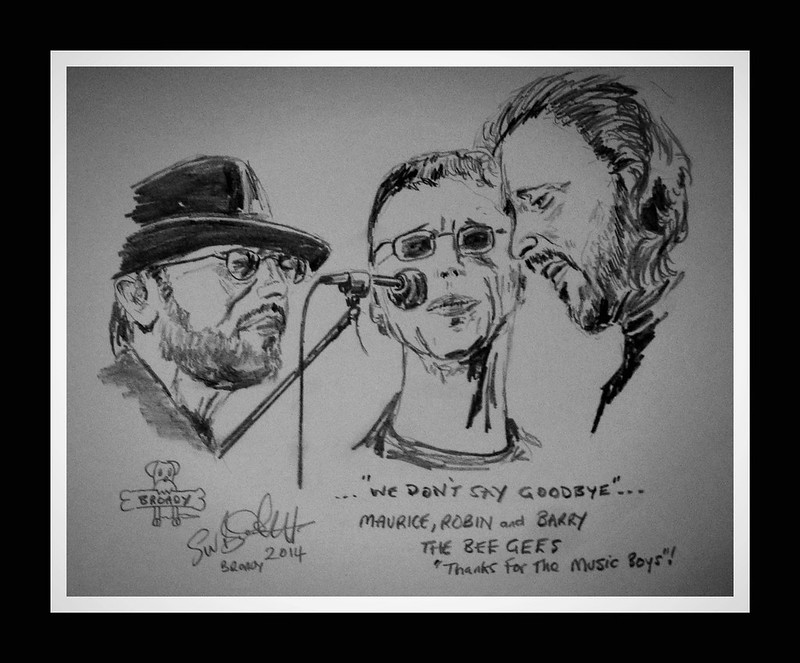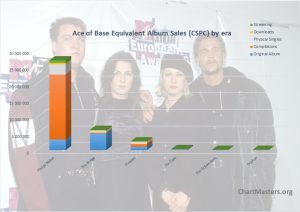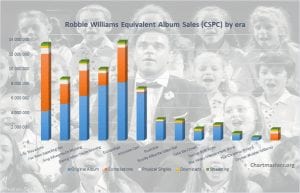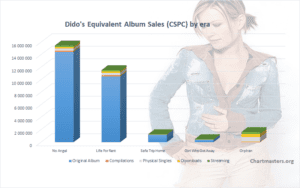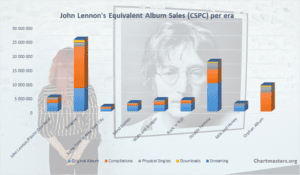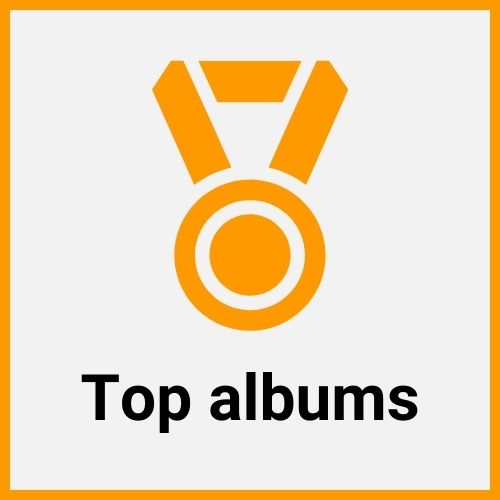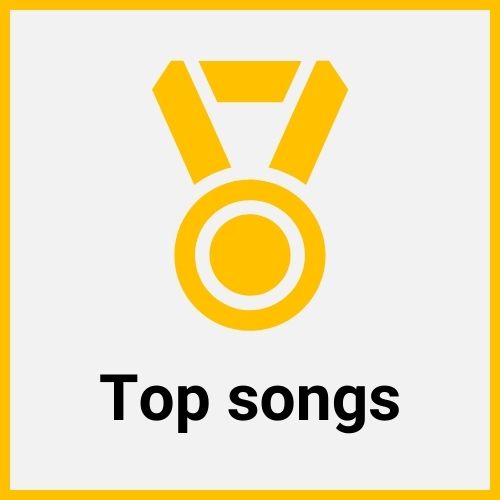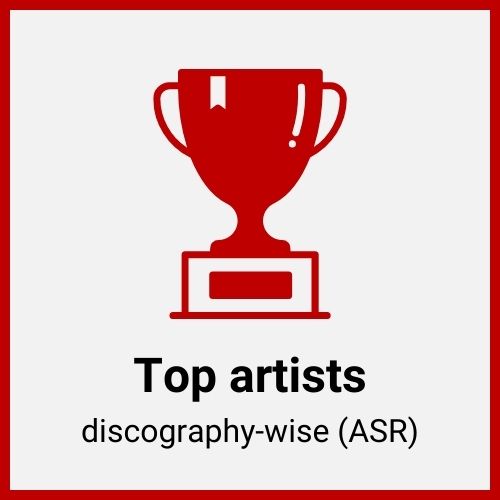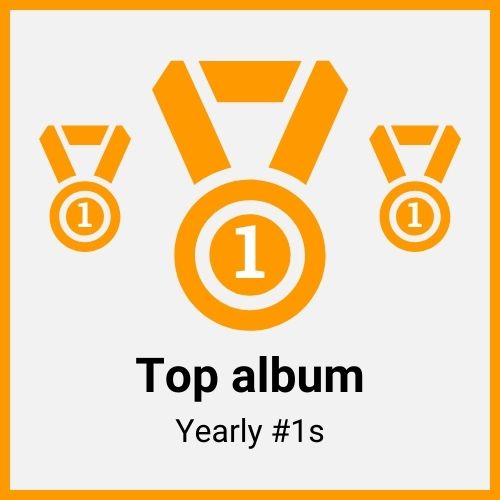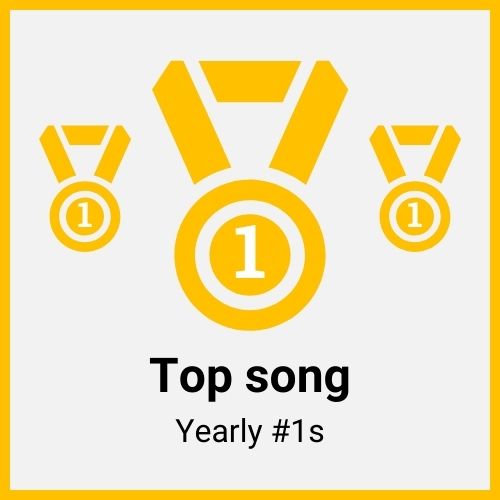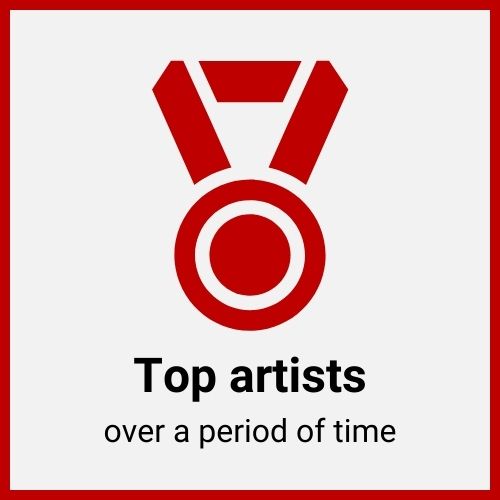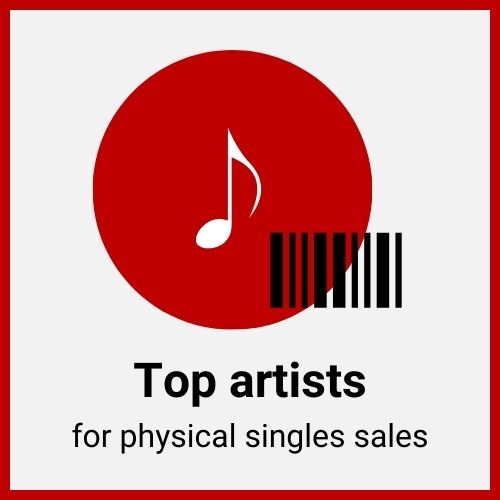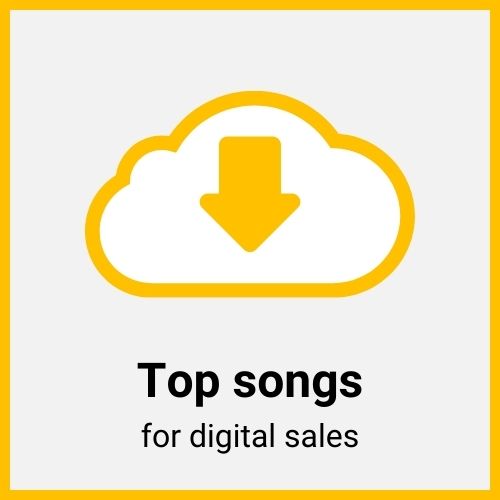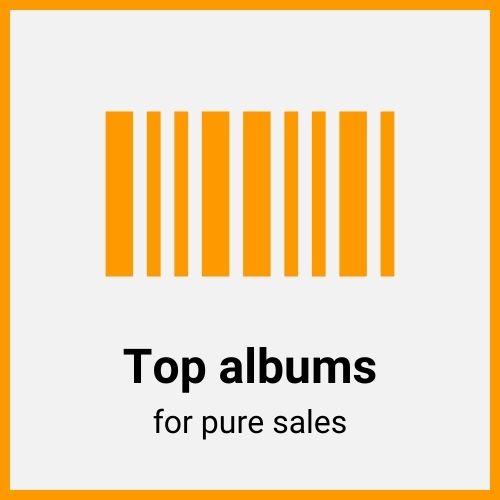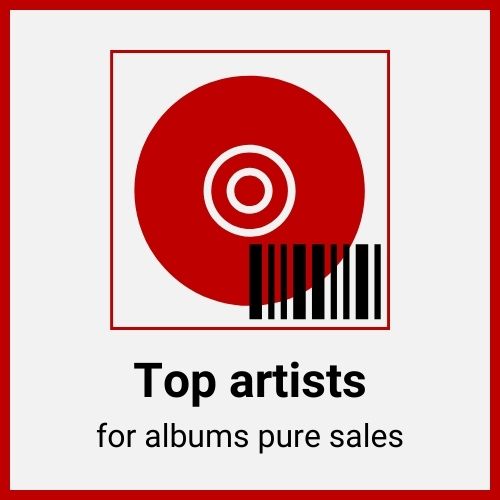Bee Gees albums and songs sales
The years that end in a 7 are synonymous of anniversaries. No, I’m not talking about the Beatles‘ cult Sgt Pepper’s which is turning 50 soon, and getting a much talked about reissue. Today we will be speaking about one of the biggest pop bands of all-time that came to prominence 40 years ago in the middle of the disco bonanza, the Bee Gees.
A decade ago, Amy Winehouse was everywhere. Two decades back, the Spice Girls were dominating while Shania Twain and Celine Dion dropped gigantic albums. In 1987, Michael Jackson‘s Bad, U2‘s Joshua Tree, Guns N’ Roses‘ Appetite For Destruction and Dirty Dancing all came too the spotlight. The Year 1967 is obviously home for various classics along with the Beatles, like the debut of the Doors or the Bee Gees’ own first hit in April 1967. The year interesting us today is 1977 though. Famous for being the year of Elvis Presley‘s passing. Three of the biggest albums ever were released in that same year – Meat Loaf‘s Bat Out of Hell, Rumours by Fleetwood Mac, the #1 CSPC album studied to date, and of course the out-of-this-world smash Saturday Night Fever.
Just like The Bodyguard, this Soundtrack contains hits from various artists but is deeply regarded as the flagship of one specific artist, in this case the Gibb brothers. While the band became well-known in another year ending in 7, 1967, thanks to the global #1 smash Massachusetts – it is this Soundtrack that secured their spot in the music industry hall of fame. If they struggled for a few years, from Jive Talkin‘ in 1975 to their input on Barbra Streisand‘s 1980 Guilty album, the Bee Gees sold an insane amount of records with ABBA being the only act coming close to their pace. From there, their popularity had various ups and downs with several revivals happening, with the last hype being generated by Robin Gibb‘s sad passing in May 2012.
With a career spanning 45 years, and such an irregular trajectory, it is difficult to accurately establish the group’s success during each period of their career and their overall success. Are they in Nirvana‘s league, or closer to the Beatles? Do they challenge solid acts a la Celine Dion, or not even close? Of course, as they are responsible for the biggest selling album ever up to 1983, Saturday Night Fever, this study ends up being absolutely mandatory to check the overall position of this record among the all-time album eras list. A strong question will be about whether it tops its label partner the Grease Soundtrack, which amassed an impressive 51,9 million equivalent album sales.
ChartMasters’ method: the CSPC
As usual, I’ll be using the Commensurate Sales to Popularity Concept (CSPC) in order to relevantly gauge the act’s results. It will not only bring you sales information for all albums, physical and download singles, as well as audio and video streaming. In fact, it will really determine the act’s popularity.
If you are not yet familiar with the CSPC method, below is a nice and short video of explaining the concept. I recommend watching it before reading on and to the sales figures. You’ll get the idea in just two minutes.
And if you want to know the full method as well as formulas, you can read the full introduction article.
Now let’s get into the artist’s detailed sales figures!
Original Albums Sales
NB: N/A means no specific number is available. Sales from the country are still accounted for in the Worldwide estimate by using figure patterns of both the artist and the country market. Countries not displayed in this fixed panel are also factored in.
Bee Gees’ 1st (1967)
:format(jpeg):mode_rgb():quality(40)/discogs-images/R-7223736-1436536002-7965.jpeg.jpg)
- America
- US – 700,000
- Canada – 75,000
- Argentina – N/A
- Brazil – N/A
- Mexico – N/A
- Asia – N/A
- Japan – N/A
- Oceania
- Australia – 35,000
- New Zealand – N/A
- Europe – 390,000
- UK – 90,000
- France – 45,000
- Germany – 100,000
- Italy – N/A
- Spain – N/A
- Sweden – N/A
- Netherlands – N/A
- Switzerland – N/A
- Austria – N/A
- Finland – N/A
- World – 1,350,000
Horizontal (1968)
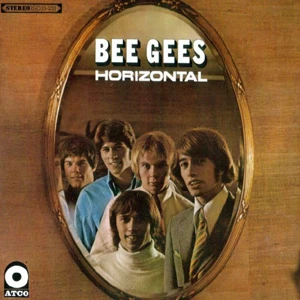
- America
- US – 400,000
- Canada – 50,000
- Argentina – N/A
- Brazil – N/A
- Mexico – N/A
- Asia – N/A
- Japan – N/A
- Oceania
- Australia – 25,000
- New Zealand – N/A
- Europe – 530,000
- UK – 50,000
- France – 35,000
- Germany – 175,000
- Italy – 40,000
- Spain – N/A
- Sweden – N/A
- Netherlands – N/A
- Switzerland – N/A
- Austria – N/A
- Finland – N/A
- World – 1,200,000
Idea (1968)
:format(jpeg):mode_rgb():quality(40)/discogs-images/R-7180113-1435519785-4131.jpeg.jpg)
- America
- US – 500,000
- Canada – 75,000
- Argentina – N/A
- Brazil – N/A
- Mexico – N/A
- Asia – N/A
- Japan – N/A
- Oceania
- Australia – 25,000
- New Zealand – N/A
- Europe – 490,000
- UK – 150,000
- France – 30,000
- Germany – 125,000
- Italy – 20,000
- Spain – N/A
- Sweden – N/A
- Netherlands – N/A
- Switzerland – N/A
- Austria – N/A
- Finland – N/A
- World – 1,250,000
Odessa (1969)

- America
- US – 500,000
- Canada – 75,000
- Argentina – N/A
- Brazil – N/A
- Mexico – N/A
- Asia – N/A
- Japan – N/A
- Oceania
- Australia – 25,000
- New Zealand – N/A
- Europe – 450,000
- UK – 50,000
- France – 40,000
- Germany – 125,000
- Italy – 50,000
- Spain – 25,000
- Sweden – N/A
- Netherlands – 50,000
- Switzerland – N/A
- Austria – N/A
- Finland – N/A
- World – 1,200,000
Cucumber Castle (1970)
- America
- US – 125,000
- Canada – 20,000
- Argentina – N/A
- Brazil – N/A
- Mexico – N/A
- Asia – N/A
- Japan – N/A
- Oceania
- Australia – 20,000
- New Zealand – N/A
- Europe – 120,000
- UK – 15,000
- France – N/A
- Germany – 30,000
- Italy – 15,000
- Spain – N/A
- Sweden – N/A
- Netherlands – N/A
- Switzerland – N/A
- Austria – N/A
- Finland – N/A
- World – 350,000
2 Years On (1970)
- America
- US – 225,000
- Canada – 30,000
- Argentina – N/A
- Brazil – N/A
- Mexico – N/A
- Asia – 30,000
- Japan – 20,000
- Oceania
- Australia – 10,000
- New Zealand – N/A
- Europe – 80,000
- UK – N/A
- France – N/A
- Germany – N/A
- Italy – N/A
- Spain – N/A
- Sweden – N/A
- Netherlands – N/A
- Switzerland – N/A
- Austria – N/A
- Finland – N/A
- World – 400,000
Trafalgar (1971)
:format(jpeg):mode_rgb():quality(40)/discogs-images/R-2345767-1457073416-2410.jpeg.jpg)
- America
- US – 225,000
- Canada – 40,000
- Argentina – N/A
- Brazil – N/A
- Mexico – N/A
- Asia – 60,000
- Japan – 40,000
- Oceania
- Australia – 30,000
- New Zealand – N/A
- Europe – 180,000
- UK – N/A
- France – N/A
- Germany – N/A
- Italy – 25,000
- Spain – 20,000
- Sweden – N/A
- Netherlands – N/A
- Switzerland – N/A
- Austria – N/A
- Finland – N/A
- World – 600,000
To Whom It May Concern (1972)
:format(jpeg):mode_rgb():quality(40)/discogs-images/R-1368182-1411738772-9363.jpeg.jpg)
- America
- US – 275,000
- Canada – 25,000
- Argentina – N/A
- Brazil – N/A
- Mexico – N/A
- Asia – 55,000
- Japan – 35,000
- Oceania
- Australia – 40,000
- New Zealand – N/A
- Europe – 180,000
- UK – N/A
- France – N/A
- Germany – N/A
- Italy – 20,000
- Spain – 25,000
- Sweden – N/A
- Netherlands – N/A
- Switzerland – N/A
- Austria – N/A
- Finland – N/A
- World – 650,000
Life in a Tin Can (1973)
- America
- US – 175,000
- Canada – 20,000
- Argentina – N/A
- Brazil – N/A
- Mexico – N/A
- Asia – 25,000
- Japan – 15,000
- Oceania
- Australia – 40,000
- New Zealand – N/A
- Europe – 170,000
- UK – N/A
- France – N/A
- Germany – N/A
- Italy – 20,000
- Spain – 15,000
- Sweden – N/A
- Netherlands – N/A
- Switzerland – N/A
- Austria – N/A
- Finland – N/A
- World – 500,000
Mr. Natural (1974)
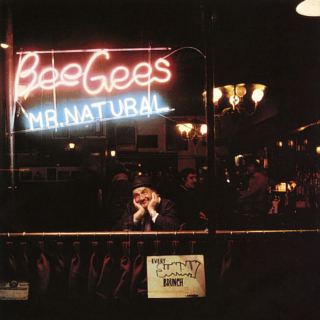
- America
- US – 100,000
- Canada – 10,000
- Argentina – N/A
- Brazil – N/A
- Mexico – N/A
- Asia – N/A
- Japan – N/A
- Oceania
- Australia – 55,000
- New Zealand – N/A
- Europe – 120,000
- UK – N/A
- France – N/A
- Germany – N/A
- Italy – N/A
- Spain – N/A
- Sweden – N/A
- Netherlands – N/A
- Switzerland – N/A
- Austria – N/A
- Finland – N/A
- World – 325,000
Main Course (1975)
:format(jpeg):mode_rgb():quality(40)/discogs-images/R-625541-1412688559-5748.jpeg.jpg)
- America
- US – 1,700,000
- Canada – 300,000
- Argentina – N/A
- Brazil – N/A
- Mexico – N/A
- Asia – 100,000
- Japan – N/A
- Oceania
- Australia – 75,000
- New Zealand – 5,000
- Europe – 450,000
- UK – N/A
- France – N/A
- Germany – 100,000
- Italy – N/A
- Spain – 75,000
- Sweden – N/A
- Netherlands – 20,000
- Switzerland – N/A
- Austria – N/A
- Finland – N/A
- World – 2,800,000
Children of the World (1976)
:format(jpeg):mode_rgb():quality(40)/discogs-images/R-671709-1301366698.jpeg.jpg)
- America
- US – 1,900,000
- Canada – 200,000
- Argentina – N/A
- Brazil – N/A
- Mexico – N/A
- Asia – 100,000
- Japan – N/A
- Oceania
- Australia – 75,000
- New Zealand – 25,000
- Europe – 510,000
- UK – N/A
- France – N/A
- Germany – 100,000
- Italy – 80,000
- Spain – N/A
- Sweden – 15,000
- Netherlands – N/A
- Switzerland – N/A
- Austria – N/A
- Finland – N/A
- World – 3,000,000
Saturday Night Fever (1977)

- America
- US – 16,200,000
- Canada – 2,100,000
- Argentina – 300,000
- Brazil – N/A
- Mexico – 575,000
- Asia – 2,300,000
- Japan – 1,250,000
- Oceania
- Australia – 850,000
- New Zealand – 270,000
- Europe – 10,560,000
- UK – 2,250,000
- France – 1,535,000
- Germany – 2,400,000
- Italy – 550,000
- Spain – 600,000
- Sweden – 225,000
- Netherlands – 475,000
- Switzerland – N/A
- Austria – 225,000
- Finland – N/A
- World – 34,800,000
Spirits Having Flown (1979)
:format(jpeg):mode_rgb():quality(40)/discogs-images/R-1274995-1337507681-4045.jpeg.jpg)
- America
- US – 5,500,000
- Canada – 750,000
- Argentina – 200,000
- Brazil – N/A
- Mexico – N/A
- Asia – 700,000
- Japan – 375,000
- Oceania
- Australia – 275,000
- New Zealand – 90,000
- Europe – 3,440,000
- UK – 675,000
- France – 525,000
- Germany – 700,000
- Italy – 225,000
- Spain – 240,000
- Sweden – 125,000
- Netherlands – 120,000
- Switzerland – N/A
- Austria – 65,000
- Finland – 30,000
- World – 11,700,000
Living Eyes (1981)
:format(jpeg):mode_rgb():quality(40)/discogs-images/R-628779-1290305596.jpeg.jpg)
- America
- US – 300,000
- Canada – 40,000
- Argentina – N/A
- Brazil – N/A
- Mexico – N/A
- Asia – 140,000
- Japan – 75,000
- Oceania
- Australia – 40,000
- New Zealand – 5,000
- Europe – 390,000
- UK – 40,000
- France – N/A
- Germany – 65,000
- Italy – 55,000
- Spain – 65,000
- Sweden – 10,000
- Netherlands – 30,000
- Switzerland – N/A
- Austria – 5,000
- Finland – N/A
- World – 1,000,000
Staying Alive (1983)

- America
- US – 1,300,000
- Canada – 175,000
- Argentina – N/A
- Brazil – N/A
- Mexico – N/A
- Asia – 800,000
- Japan – 500,000
- Oceania
- Australia – 50,000
- New Zealand – N/A
- Europe – 940,000
- UK – 100,000
- France – 100,000
- Germany – 225,000
- Italy – 150,000
- Spain – 50,000
- Sweden – 10,000
- Netherlands – 25,000
- Switzerland – 65,000
- Austria – 15,000
- Finland – N/A
- World – 3,550,000
E.S.P. (1987)
:format(jpeg):mode_rgb():quality(40)/discogs-images/R-4600626-1423643506-5376.jpeg.jpg)
- America
- US – 150,000
- Canada – 20,000
- Argentina – N/A
- Brazil – N/A
- Mexico – N/A
- Asia – 200,000
- Japan – 50,000
- Oceania
- Australia – 50,000
- New Zealand – N/A
- Europe – 1,960,000
- UK – 380,000
- France – N/A
- Germany – 775,000
- Italy – 80,000
- Spain – 60,000
- Sweden – 15,000
- Netherlands – 50,000
- Switzerland – 105,000
- Austria – 60,000
- Finland – N/A
- World – 2,700,000
One (1989)
:format(jpeg):mode_rgb():quality(40)/discogs-images/R-1368958-1213544797.jpeg.jpg)
- America
- US – 250,000
- Canada – 25,000
- Argentina – N/A
- Brazil – N/A
- Mexico – N/A
- Asia – 80,000
- Japan – 25,000
- Oceania
- Australia – 40,000
- New Zealand – N/A
- Europe – 760,000
- UK – 30,000
- France – 125,000
- Germany – 325,000
- Italy – 30,000
- Spain – N/A
- Sweden – 5,000
- Netherlands – 20,000
- Switzerland – 30,000
- Austria – 5,000
- Finland – N/A
- World – 1,250,000
High Civilization (1991)
:format(jpeg):mode_rgb():quality(40)/discogs-images/R-452701-1290306044.jpeg.jpg)
- America
- US – 100,000
- Canada – 10,000
- Argentina – N/A
- Brazil – N/A
- Mexico – N/A
- Asia – N/A
- Japan – N/A
- Oceania
- Australia – N/A
- New Zealand – N/A
- Europe – 1,060,000
- UK – 50,000
- France – N/A
- Germany – 600,000
- Italy – N/A
- Spain – N/A
- Sweden – 5,000
- Netherlands – 15,000
- Switzerland – 60,000
- Austria – 40,000
- Finland – N/A
- World – 1,300,000
Size Isn’t Everything (1993)
:format(jpeg):mode_rgb():quality(40)/discogs-images/R-1957036-1254934336.jpeg.jpg)
- America
- US – 175,000
- Canada – 20,000
- Argentina – N/A
- Brazil – N/A
- Mexico – N/A
- Asia – N/A
- Japan – N/A
- Oceania
- Australia – N/A
- New Zealand – N/A
- Europe – 520,000
- UK – 175,000
- France – 50,000
- Germany – 125,000
- Italy – 15,000
- Spain – N/A
- Sweden – 5,000
- Netherlands – 20,000
- Switzerland – 15,000
- Austria – 15,000
- Finland – N/A
- World – 900,000
Still Waters (1997)

- America
- US – 1,050,000
- Canada – 125,000
- Argentina – N/A
- Brazil – N/A
- Mexico – N/A
- Asia – N/A
- Japan – N/A
- Oceania
- Australia – 160,000
- New Zealand – 50,000
- Europe – 1,790,000
- UK – 250,000
- France – 240,000
- Germany – 625,000
- Italy – 50,000
- Spain – 40,000
- Sweden – 15,000
- Netherlands – 80,000
- Switzerland – 75,000
- Austria – 50,000
- Finland – N/A
- World – 3,600,000
This Is Where I Came In (2001)
- America
- US – 300,000
- Canada – 50,000
- Argentina – N/A
- Brazil – N/A
- Mexico – N/A
- Asia – N/A
- Japan – N/A
- Oceania
- Australia – 40,000
- New Zealand – 15,000
- Europe – 540,000
- UK – 110,000
- France – 40,000
- Germany – 200,000
- Italy – 10,000
- Spain – 20,000
- Sweden – N/A
- Netherlands – 20,000
- Switzerland – 20,000
- Austria – 15,000
- Finland – N/A
- World – 1,100,000
Original Album Sales – Comments
Over the course of 22 studio LPs, from their first international release, the Bee Gees moved 75,5 million albums. If the average of 3,4 million units per album seems low already, considering 46,5 million copies come from two albums only, excluding those two albums leads to a median of a mere 1,22 million.
A one-album wonder, next! Well, not really. It is the strength of the Commensurate Sales to Popularity Concept to erase exploitation gaps between distinct artists. While acts like the Beatles had their studio albums extensively promoted over various decades, Polygram / Universal constructed the Bee Gees’ catalog differently.
Their first four albums sold very well upon release, hitting the top 10 or even #1 in most countries. The Bee Gees were even one of the very first acts to expand beyond the usual English-speaking territories, finding incredible successful all over Latin America and Asia while breaking records in South Africa. Markets were heavily singles-based rather than albums-based back then. During the first half of the 70s, when the LP started to grow, the band’s fame collapsed. Then, when their attractiveness climbed immensely after the release of Saturday Night Fever, most of their pre-1975 albums were out of print. Instead, various labels issued tons of compilations, standard priced or budget ones, covering their early hits. This situation remained true most of their career – Saturday Night Fever and Spirits Having Flown are the only two studio albums from the group that can be found at music retailers without struggling to find them. Well, not struggling too much at least. Of course, all those compilations that took over the band’s catalog appeal will be treated in the related section later on in this article.
We can’t avoid commenting on Saturday Night Fever’s total of 34,8 million units. It falls short of the 38,1 million copies shifted by Grease, in spite of outselling it by 22 to 15 million during their promotional periods. The last word hasn’t been said yet, however…
One last point about pure album sales, of course Spirits Having Flown hasn’t sold 20 million units as widely reported for so long, including by Billboard in 1997. That figure wasn’t only about the album, but included sales of its singles too. A smooth transition, as those physical singles sales are going to be displayed on the following sections!
1967 Bee Gees’ 1st – 1,350,000
1968 Horizontal – 1,200,000
1968 Idea – 1,250,000
1969 Odessa – 1,200,000
1970 Cucumber Castle – 350,000
1970 2 Years On – 400,000
1971 Trafalgar – 600,000
1972 To Whom It May Concern – 650,000
1973 Life in a Tin Can – 500,000
1974 Mr. Natural – 325,000
1975 Main Course – 2,800,000
1976 Children of the World – 3,000,000
1977 Saturday Night Fever – 34,800,000
1979 Spirits Having Flown – 11,700,000
1981 Living Eyes – 1,000,000
1983 Staying Alive – 3,550,000
1987 E.S.P. – 2,700,000
1989 One – 1,250,000
1991 High Civilization – 1,300,000
1993 Size Isn’t Everything – 900,000
1997 Still Waters – 3,600,000
2001 This Is Where I Came In – 1,100,000
Physical Singles Sales
Unlike most big historical bands like Pink Floyd or Led Zeppelin, the Bee Gees also sold a good share of physical singles. No doubt they extensively used the favorable background of the 70s solid singles market but, just how high have their sales climbed?
As a reminder, the weighting is done with a 10 to 3 ratio between one album and one physical single.
1967-68
Massachusetts is largely regarded as the huge hit of the early days of the Bee Gees – it indeed was with a heavy 3,35 million units sold, in spite of a relatively low half a million sold in the US. Other songs were far from being weak as well, as they all sold at least 600,000 copies, except Let There Be Love which was released in the Netherlands only.
So many sizeable hits from each album conclude with equivalent album sales as high or even higher than their original album sales. An example is Horizontal which sold 1,2 million pure albums while its singles sales equal to 1,86 million albums.
Combined, those singles sold 12,7 million units – within a single year!
Bee Gees’ 1st (1967) – 684,000 equivalent albums
Holiday – 670,000
New York Mining Disaster 1941 – 840,000
To Love Somebody – 770,000
Horizontal (1968) – 1,863,000 equivalent albums
World – 1,270,000
Massachusetts – 3,350,000
Words – 1,590,000
Idea (1968) – 1,269,000 equivalent albums
I Started a Joke – 1,520,000
I’ve Gotta Get a Message to You – 2,100,000
Jumbo – 600,000
Let There Be Love – 10,000
1969-70
While the pace and size of hits decreased a bit, the group continued to register decent sales with their albums Odessa, Cucumber Castle and 2 Years On. Lonely Days is the strongest, the #3 US hit moved 1,76 million units.
Once again, those totals happen to be being bigger than the original album’s sales – Cucumber Castle and 2 Years On did respectively 350,000 and 400,000 copies in their original form.
Odessa (1969) – 495,000 equivalent albums
First of May – 1,050,000
Melody Fair – 600,000
Cucumber Castle (1970) – 384,000 equivalent albums
If Only I Had My Mind on Something Else – 90,000
I.O.I.O. – 410,000
Don’t Forget to Remember – 780,000
2 Years On (1970) – 528,000 equivalent albums
Lonely Days – 1,760,000
1971-73
The early 70s is really when the band’s popularity decelerated. How Can You Mend a Broken Heart was a huge global hit, selling an impressive 2,22 million units, although it wasn’t even issued in key markets like the UK, Germany, France or Japan.
Then Run To Me was not that big, but still an OK seller. The tough flop of the album Life in a Tin Can was validated on the singles front too with virtually no sales whatsoever.
Trafalgar (1971) – 723,000 equivalent albums
How Can You Mend a Broken Heart – 2,220,000
Don’t Wanna Live Inside Myself – 180,000
Israel – 10,000
To Whom It May Concern (1972) – 363,000 equivalent albums
Run to Me – 840,000
Alive – 370,000
Life in a Tin Can (1973) – 12,000 equivalent albums
Saw a New Morning – 40,000
1974-76
The Disco turn taken by the Bee Gees from 1974 paid off big time in singles sales. During this period, their flagship Jive Talkin’ sold close to 2 million copies while hitting the top spot in the US. More than selling well on its own, it paved the way to subsequent singles.
Everything they released, including non-European singles, started to move past half a million units. Both LPs Main Course and Children of the World fully enjoyed those hits with big equivalent album sales.
In total, the band crossed the 30 million mark in physical singles sales in during that era, completely breaking the idea of the Bee Gees becoming big thanks only to Saturday Night Fever.
Mr. Natural (1974) – 93,000 equivalent albums
Charade – 120,000
Mr. Natural – 190,000
Main Course (1975) – 1,305,000 equivalent albums
Jive Talkin’ – 1,910,000
Nights on Broadway – 1,140,000
Fanny (Be Tender with My Love) – 730,000
Edge of the Universe – 570,000
Children of the World (1976) – 1,557,000 equivalent albums
You Should Be Dancing – 2,380,000
Love So Right – 2,160,000
Boogie Child – 640,000
Children of the World – 10,000
1977-81
At 4,89 million, How Deep Is Your Love is the weakest seller of the five classics from `’77 – ’81. This shows how utterly massive they were at the time. All four of Stayin’ Alive, Night Fever, Tragedy and Too Much Heaven moved over 5 million units.
So far, the only album which generated more than 15 million singles sales is the 1978 RSO Soundtrack Grease at 24,4 million. It was alone in this stratosphere up to now, but Saturday Night Fever comes close at 19,8 million. Please note this tally includes 2,91 million sales which do not belong to the Bee Gees, while it excludes sales of hits part of the track list, but which were released years before, like the group’s own Jive Talkin’ and You Should Be Dancing.
Among non-Soundtracks, the biggest album studied so far is Make It Big by Wham!, an album in which its singles sold 14,4 million units. Spirits Having Flown at 13,17 million takes the runner up spot.
Superb results for those two albums imply absolute disaster for an album responsible for a mere 860,000 singles a couple of years later. That’s how terrible Living Eyes did.
Saturday Night Fever (1977) – 5,943,000 equivalent albums
Stayin’ Alive – 6,470,000
How Deep Is Your Love – 4,890,000
Night Fever -5,520,000
More Than a Woman – 20,000
(Yvonne Elliman) If I Can’t Have You – 2,360,000
(KC and the Sunshine Band) Boogie Shoes – 550,000
Spirits Having Flown (1979) – 3,951,000 equivalent albums
Tragedy – 5,050,000
Too Much Heaven – 5,640,000
Love You Inside Out – 2,360,000
Spirits (Having Flown) – 120,000
Living Eyes (1981) – 258,000 equivalent albums
Living Eyes – 290,000
He’s a Liar – 570,000
1983-91
The flashy days were over by the 80s for the group. With that said, the Gibb brothers were still capable of dropping big hits. One of them was You Win Again, which did wonders in Europe. After more than 65 million singles sold, remaining able to always drop a 2 million seller is quite meritorious.
Staying Alive (1983) – 363,000 equivalent albums
The Woman in You – 760,000
Someone Belonging to Someone – 450,000
E.S.P. (1987) – 741,000 equivalent albums
E.S.P. – 170,000
You Win Again – 2,290,000
Angela – 10,000
One (1989) – 264,000 equivalent albums
Ordinary Lives – 240,000
One – 640,000
High Civilization (1991) – 186,000 equivalent albums
Secret Love – 570,000
The Only Love – 50,000
1993 onwards and orphan songs
The last bunch of singles includes two million sellers from 1997, 30 years after their debut, and two entire decades after Saturday Night Fever, Alone and Immortality.
Those late hits close the mark on 72,8 million singles sold by the UK / Australian band. Obviously, this doesn’t account for all sales of songs they wrote for other artists which would push this total into the 9 digits territory.
Size Isn’t Everything (1993) – 264,000 equivalent albums
Paying the Price of Love – 270,000
How to Fall in Love, Part 1 – 20,000
For Whom the Bell Tolls – 560,000
Kiss Of Life – 30,000
Still Waters (1997) – 483,000 equivalent albums
Alone – 1,270,000
I Could Not Love You More – 60,000
Still Waters Run Deep – 280,000
This Is Where I Came In (2001) – 30,000 equivalent albums
This Is Where I Came In – 100,000
Orphan – 951,000 equivalent albums
Turn Around, Look At Me – 30,000
I Was A Lover, A Leader Of Men – 10,000
Spicks And Specks – 130,000
Tomorrow Tomorrow – 550,000
When The Swallows Fly – 10,000
In The Morning – 80,000
My World – 940,000
Wouldn’t I Be Someone – 120,000
Immortality – 1,300,000
Digital Singles Sales
The standard misconception of digital singles sales is that they replaced physical single sales. It may be true for newly released hits, but not so for catalog ones. The fact anything is available anytime makes digital singles a product much closer to former catalog albums. When the public was looking for an artist’s big hits, they went after a best of, during the last 10 years they were capable of cherry-picking those big hits in downloads instead.
Thus, bands often flagged as “singles bands” in the old days aren’t necessarily the biggest sellers in the digital area as their catalog sales aren’t always that great. Something confirmed with the Bee Gees, as we will see.
As a reminder, the weighting is done with a 10 to 1,5 ratio between one album and one digital single.
1967-70
Years passed since the Bee Gees’ first hits. As mentioned in the introduction, their first international single reaches 50 years old this month. The singles unfortunately haven’t passed those years too well, as most of them are almost forgotten nowadays.
Only three of those songs have relevant download figures – To Love Somebody, Massachusetts and I Started A Joke, each selling roughly half a million units. Sales figures of their remaining songs are fairly low.
Bee Gees’ 1st (1967) – 120,000 equivalent albums
New York Mining Disaster 1941 – 100,000
To Love Somebody – 600,000
Remaining tracks – 100,000
Horizontal (1968) – 128,000 equivalent albums
Massachusetts – 500,000
Words – 250,000
Remaining tracks – 100,000
Idea (1968) – 83,000 equivalent albums
I Started a Joke – 425,000
I’ve Gotta Get a Message to You – 100,000
Remaining tracks – 25,000
Odessa (1969) – 15,000 equivalent albums
First of May – 75,000
Remaining tracks – 25,000
Cucumber Castle (1970) – 15,000 equivalent albums
Don’t Forget to Remember – 75,000
Remaining tracks – 25,000
1970-74
If early hits suffered from time, their early flops weren’t going to do well either. With the exception of How Can You Mend a Broken Heart, other songs from this first half of the 70s have dreadful results on the downloads front.
2 Years On (1970) – 15,000 equivalent albums
Lonely Days – 75,000
Remaining tracks – 25,000
Trafalgar (1971) – 60,000 equivalent albums
How Can You Mend a Broken Heart – 400,000
Remaining tracks – 0
To Whom It May Concern (1972) – 15,000 equivalent albums
Run to Me – 75,000
Remaining tracks – 25,000
Life in a Tin Can (1973) – 0 equivalent albums
Remaining tracks – 0
Mr. Natural (1974) – 5,000 equivalent albums
Remaining tracks – 30,000
1975-81
Unsurprisingly, Saturday Night Fever is home to the band’s biggest hits in download sales. The obvious leader is Stayin’ Alive at 4 million units sold. Hits from Spirits Having Flown fade in comparison, with only a combined total of 1,4 million units sold.
Main Course (1975) – 120,000 equivalent albums
Nights on Broadway – 200,000
Jive Talkin’ – 500,000
Remaining tracks – 100,000
Children of the World (1976) – 135,000 equivalent albums
You Should Be Dancing – 700,000
Remaining tracks – 200,000
Saturday Night Fever (1977) – 1,335,000 equivalent albums
Stayin’ Alive – 4,000,000
How Deep Is Your Love – 1,900,000
Night Fever – 1,250,000
More Than a Woman – 950,000
Remaining tracks – 800,000
Spirits Having Flown (1979) – 210,000 equivalent albums
Tragedy – 600,000
Too Much Heaven – 500,000
Remaining tracks – 300,000
Living Eyes (1981) – 3,000 equivalent albums
Remaining tracks – 20,000
1983-91
You Win Again is largely the leading force of this period once again. This song was even the highest charted track in various European countries after Robin Gibb passed away, topping Stayin’ Alive.
Staying Alive (1983) – 3,000 equivalent albums
Remaining tracks – 20,000
E.S.P. (1987) – 120,000 equivalent albums
You Win Again – 800,000
Remaining tracks – 0
One (1989) – 15,000 equivalent albums
Remaining tracks – 100,000
High Civilization (1991) – 8,000 equivalent albums
Secret Love – 50,000
Remaining tracks – 0
1993 onwards and orphan songs
Nothing much to talk about with these late career songs which have low results in the digital field.
Career-wise, that’s less than 17 million download singles sold, including nearly half from their Saturday Night Fever hits alone! A situation kind of embarrassing considering they issued 22 albums, while they had only 4 new songs on that Soundtrack!
Size Isn’t Everything (1993) – 15,000 equivalent albums
For Whom the Bell Tolls – 50,000
Remaining tracks – 50,000
Still Waters (1997) – 45,000 equivalent albums
Alone – 150,000
Remaining tracks – 150,000
This Is Where I Came In (2001) – 15,000 equivalent albums
This Is Where I Came In – 50,000
Remaining tracks – 50,000
Orphan – 225,000 equivalent albums
Immortality – 400,000
Remaining tracks – 1,100,000
Streaming Sales
As seen with the example of the Beatles, today’s weight of Spotify is steadily increasing, representing as much as 63,5% of overall streams on their platform. The Swedish giant recently announced they broke the 50-million barrier of paid subscribers.
We will keep the Spotify-All Audio Streaming services ratio updated as much as possible, especially when the next IFPI RIN comes out next month covering the 2016 Global market. For now, we will be sticking with this 63,5% rate.
What is this section about? Here we will be reviewing streams from all songs and all albums of the Bee Gees, converting each of them into equivalent album sales. The equivalent album sales is the division of the comprehensive streaming figure by 1500 as is now the norm in the new industry model.
Streaming Part 1 – New Australia Hit Makers
Streaming brings us an incredible amount of information. With those figures alone, we can guess pretty decently how big each hit has been. Not only that, but we can also see how the Bee Gees’ label exploited their repertoire.
By quickly removing studio albums from print, their label killed completely the appeal of their non-single tracks. They would have hardly performed incredibly well in any case, but still less than 100,000 streams for most of them is very telling of how very few people were interested in them.
As for hits, they face mixed fortunes. They are mostly divided into two categories. Forgotten hits, which sit in the 1-2 million streams range. Then those that retained a decent level of appeal at 5+ million plays. To Love Somebody is the best example here at nearly 15 million, some 70% of their debut album’s total. Obviously, equivalent album sales of those streaming plays aren’t big at 23,000 and 18,000 units for Bee Gees’ First and Horizontal respectively.
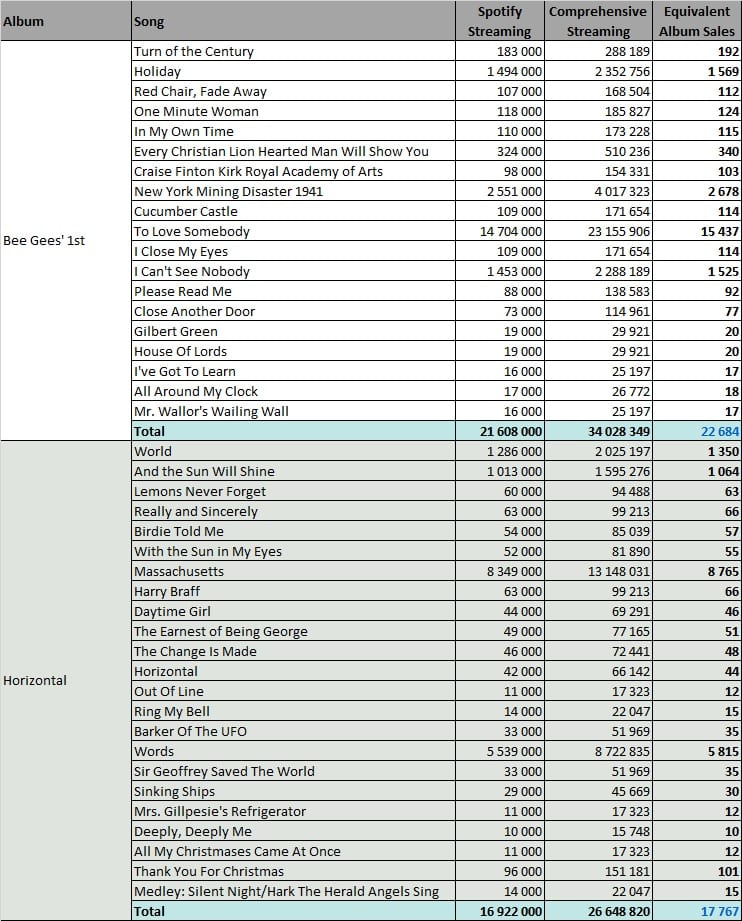
Streaming Part 2 – More Ideas
More of the same with arguably weaker albums. Songs like First of May or I’ve Got A Message To You were strong hits upon release but register rather bad streaming results. The only acceptable tally is the one of I Started A Joke at 9 million streams.
Equivalent album sales are on 14,000 and 4,000 units respectively, the former in spite of an extensive 21-track album.

Streaming Part 3 – Lost Battles
As weak as some of those albums have been, they were still home to various popular hits. The main one was How Can You Mend a Broken Heart, a huge 4-weeks at #1 in the US and all over the American continent.
Memory is often selective though, and while their disco hits remain in the mind of everyone, those earlier smashes are struggling. The previously mentioned Trafalgar single has less than 6 million plays while the remainder of the track list totals a mere 525,000 streams. Those abysmal results are convert into less than 12,000 equivalent album sales combined for those three albums.
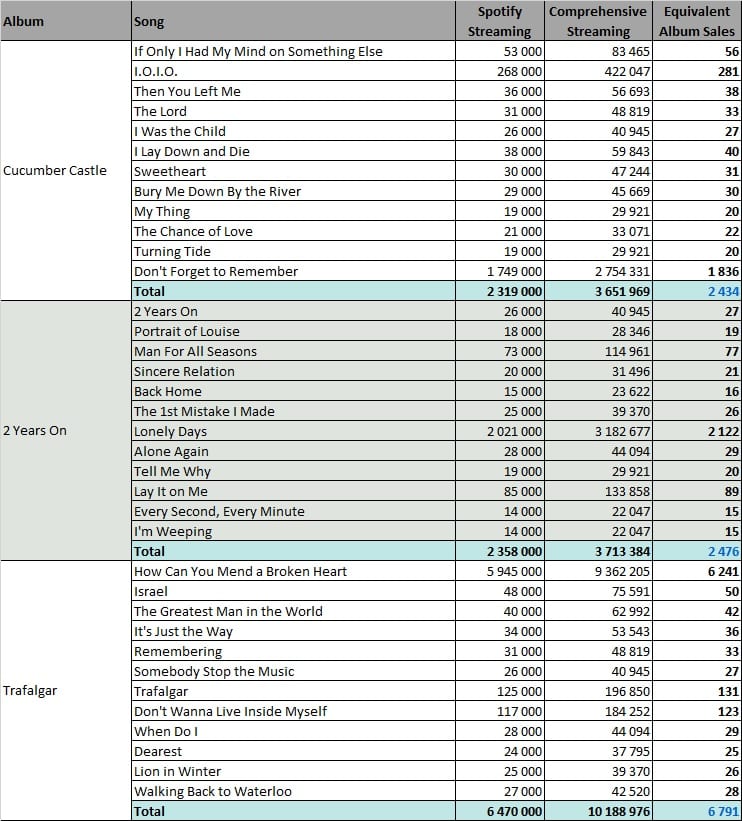
Streaming Part 4 – Running Away From the Bees
Well, what can be said about such figures? The Life In a Tin Can is quite simply the worst performer we have ever met during all our studies with an unreal 202,000 plays for all songs combined together.
At 1,75m Run To Me is the only song from these albums over 155,000 streams. Who could have guessed at the time that the Gibb brothers were going to drop the biggest album of all-time a few years later?
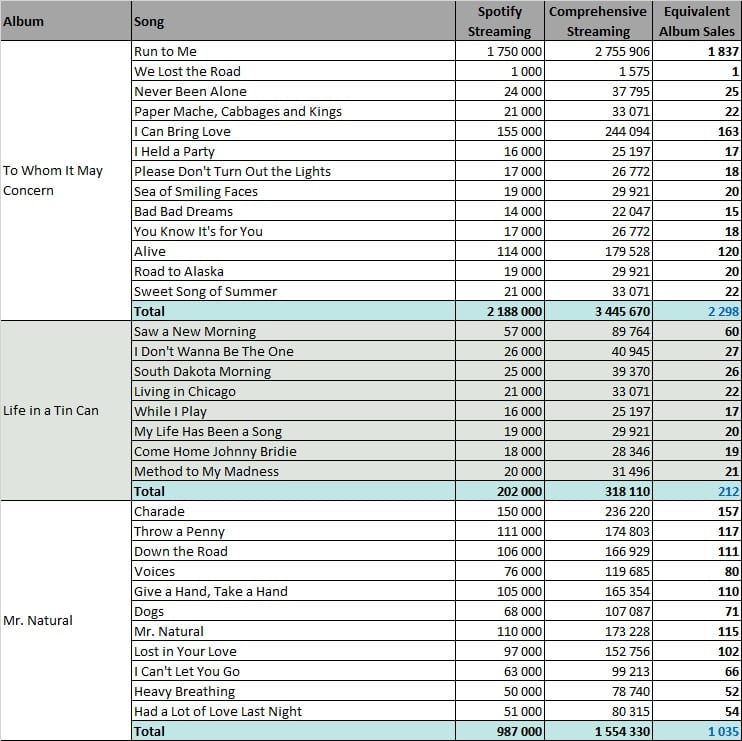
Streaming Part 5 – New Course
Main Course was a pivotal album in the career of the Bee Gees. After years of soft Rock tained Pop, the group started to switch into a Disco oriented sound from the mid-70s.
The impact was highly positive. Jive Talkin’ shot to #1 in the US, and while its streams at 8 million aren’t that good in comparison to such an initial reception, the trend had begun. Their next #1 smash, You Should Be Dancing, quickly confirmed it. This latter song has a solid tally of 17 million streams, nearly 10 times more than Love So Right which climbed to #3 in the US back in the day.
While the trend was good, the final tallies remain unimpressive with 16,000 equivalent album sales for Main Course and 22,000 for Children of the World.
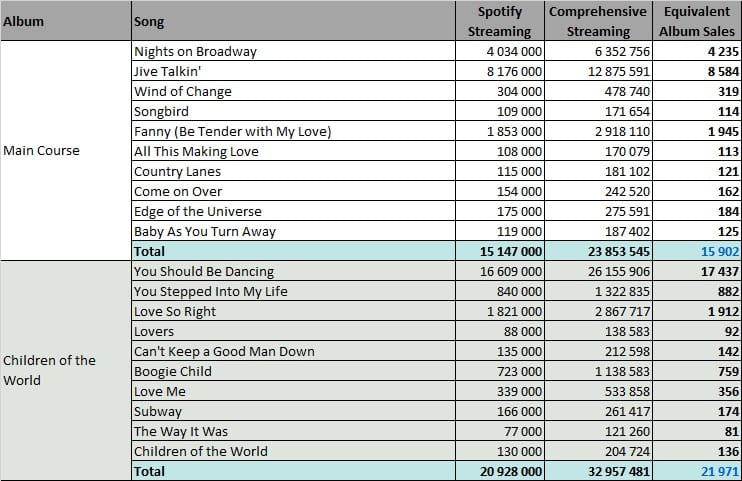
Streaming Part 6 – All-Time Fever
Clearly, the Saturday Night Fever trademark is powerful. Upon release, hits like Tragedy or Too Much Heaven were just as big as How Deep Is Your Love or Night Fever, all of which sold 5 million physical singles give or take half a million units. By now, while Spirits singles have OK-ish numbers on streams with the four of them over 1 million plays and a combined 24 million, they come nowhere near to the cult Soundtrack songs.
In fact, Stayin’ Alive has a gigantic 113 million streams while the remaining 3 big hits total for 111 million.
Saturday Night Fever gets rewarded from such a strength with 259,000 equivalent album sales – 235,000 of which from the Bee Gees songs – while Spirits Having Flown is on 26,000 units.
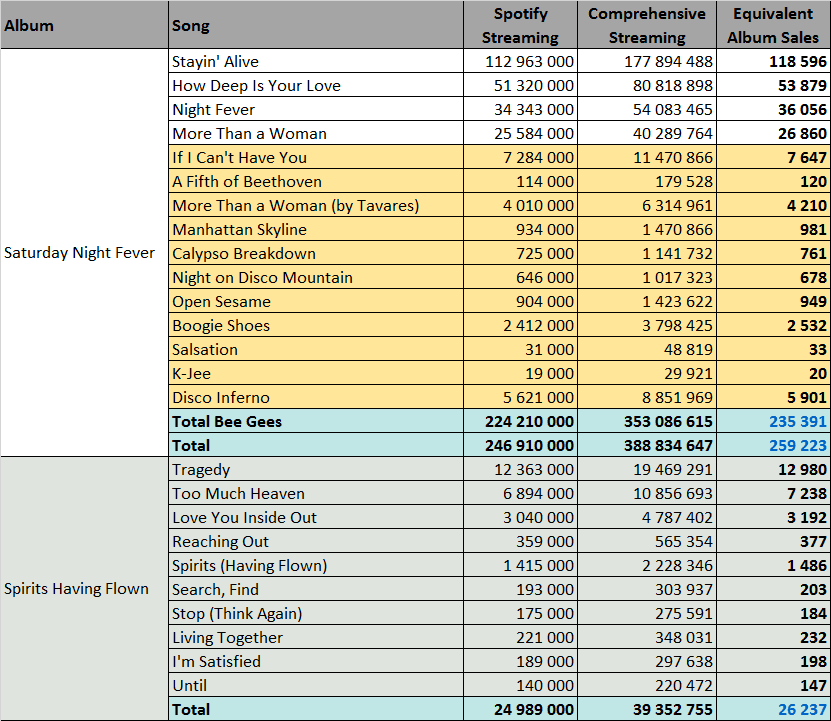
Streaming Part 7 – Stayin’ Alive… or Not
The absolute disaster Living Eyes is confirmed by its Spotify numbers. It is pretty unbelievable to see an album under 1 million plays combined while it came out a mere two years after the band absolute domination on the music industry.
The Soundtrack Staying Alive which aimed to revive the band success by using the already tested format failed to do well that time. The album E.S.P. isn’t present on Spotify, although You Win Again, far and away the biggest song from it, is there thanks to compilations. Interestingly, this late song has more streams than the likes Massachusetts or Too Much Heaven.
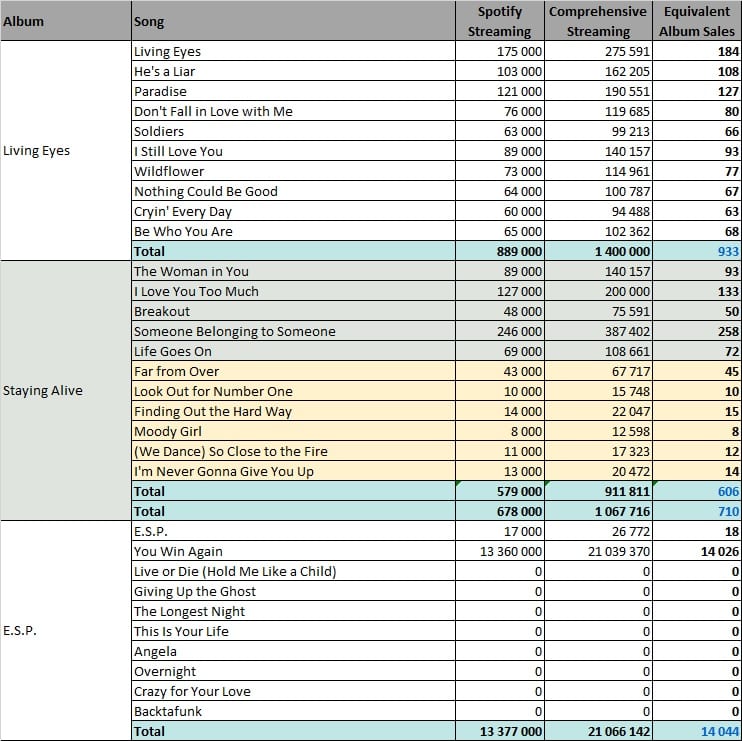
Streaming Part 8 – 3 Albums, 0 Hit
More than a decade after the Disco fever the group was facing strong difficulties to remain relevant. Indeed, no song from their 1989-1993 era did really well, all of which are under 2 million streams. In terms of equivalent album sales, all those records are truly low.
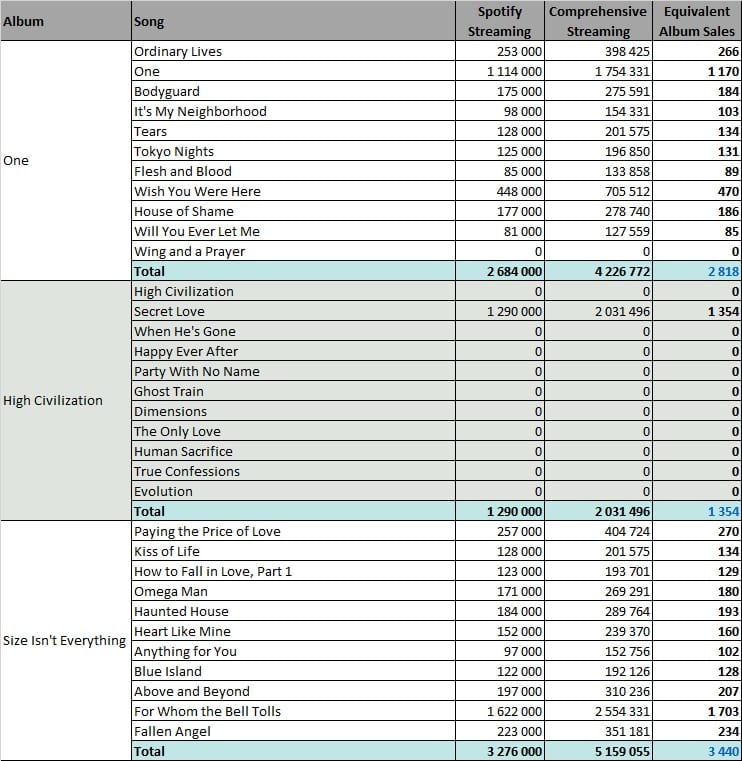
Streaming Part 9 – Closing Chapter
An interesting observation from the last two studio albums of those pop legends is that in spite of an obvious lack of strong hits – although Alone numbers ain’t bad in the band scale – is the much bigger consistency they both got. Most album tracks are on 200,000 plays or more which highlights a growing credibility in their material.
Rewards in terms of equivalent album sales are weak though with only 8,000 and 6,000 units registered by each album.
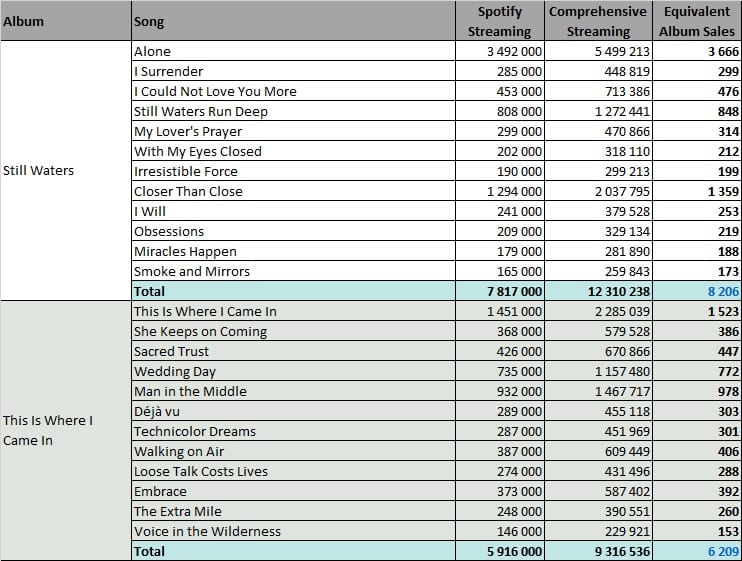
Streaming Part 10 – Orphan Songs
This list of Orphan songs includes singles from compilations, duets with other artists as well as the band early songs from their two Australian-only albums that preceded Bee Gees’ 1st.
Biggest two songs are divas-related – Immortality, a duet with Celine Dion, and Guilty, the title track of the biggest Barbra Streisand studio album. Both songs are getting closer and closer to the 10 million mark.
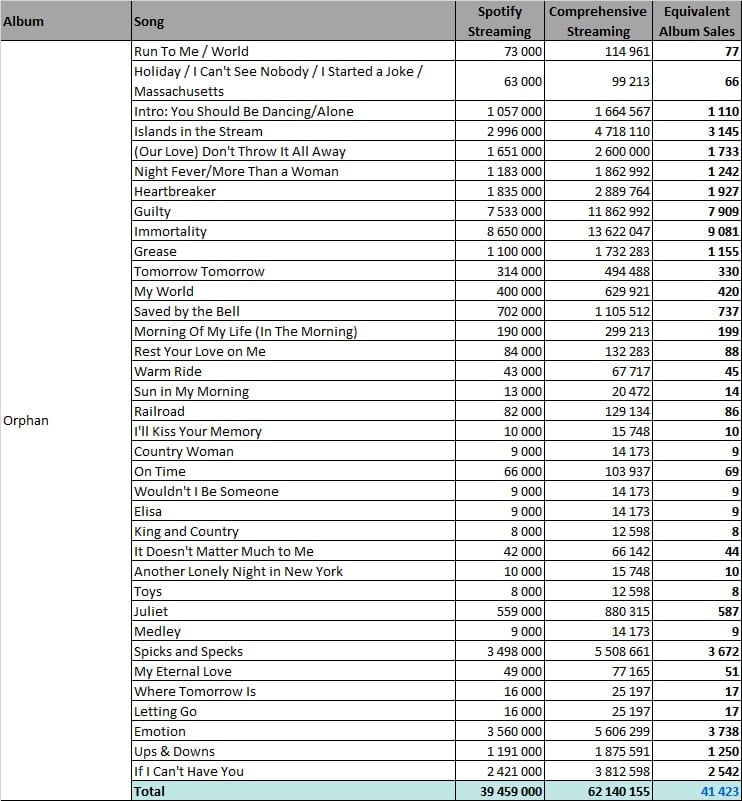
Streaming Part 11 – Where Are you?
To fully treat the Streaming area of the band, here is a list of songs which appeared on some of their compilations or lives track lists and which are failing to be available so far, thus they are all listed with 0 stream.
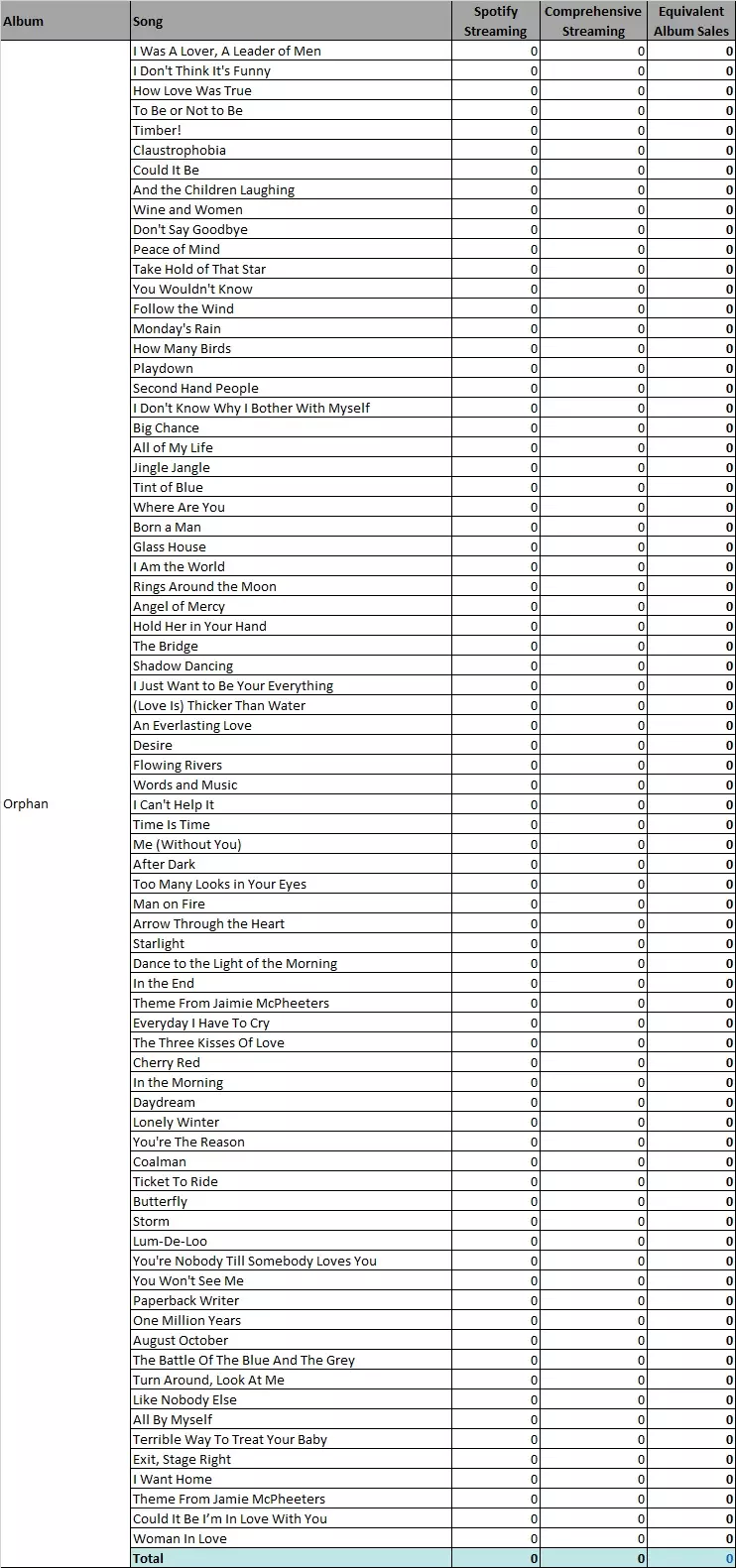
Full Length related records Sales
It sounds fairly logical to add together weighted sales of one era – studio album, physical singles, downloads, streams – to get the full picture of an album popularity. For older releases though, they also generate sales of various live, music videos and compilation albums.
All those packaging-only records do not create value, they exploit the one originated from the parent studio album of each of its tracks instead. Inevitably, when such compilations are issued this downgrades catalog sales of the original LP. Thus, to perfectly gauge how worth this latter is, we need to re-assign sales proportionally to its contribution of all compilations which feature its songs. The following table explains it all.
Remaining Long Format Part 1 – Live
How to understand this table? If you check for example One Night Only live album line, those figures mean it sold 6,900,000 units worldwide. The second statistics column means all versions of all songs included on this package add for 284 million streaming plays on Spotify.
The second part at the right of the table shows how many streams are coming from each original album plus the share it represents on the overall package streams. Thus, streaming figures tell us Saturday Night Fever songs are responsible for 58% of the One Night Only tracklist attractiveness, which means it generated 3,998,000 of its 6,900,000 album sales and so on for the other records.
Those two live albums are a perfect illustration of the two kind of compilations issued by the band – those focusing on their early years which got sales generated from several LPs like Bee Gees’ 1st or Children of the World and those containing songs from their entire career which are massively dominated by Saturday Night Fever hits.
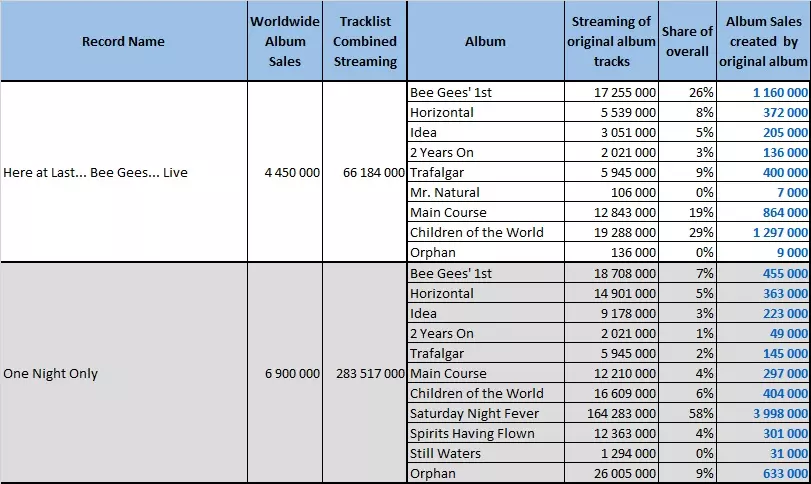
Remaining Long Format Part 2 – Major Compilation 1
All those three compilations came out before the Disco earthquake. As every such package, main sales providers are the band first three albums.
Interestingly, an album like Bee Gees’ 1st generated more sales of Best of Bee Gees alone than it sold by itself, which is quite logical since the compilation quickly replaced the studio set. It is just one more evidence of the need of CSPC numbers which enable us to get rid of those different catalog exploitation over years.
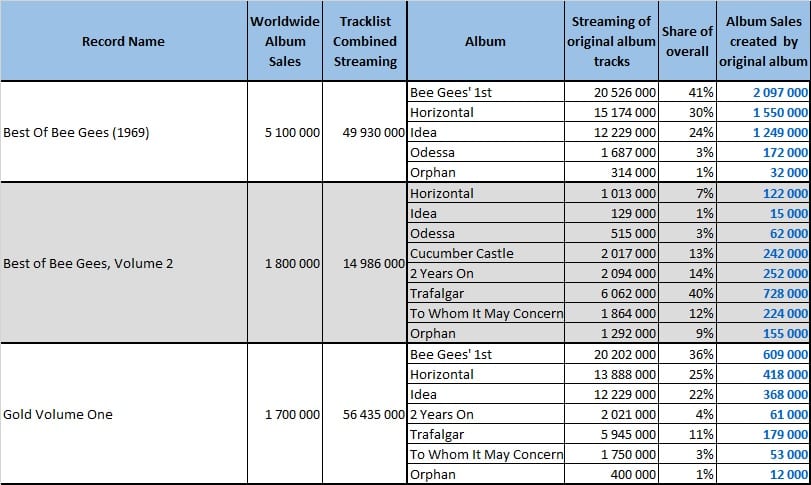
Remaining Long Format Part 3 – Major Compilation 2
It is impossible to continue doubting of the overwhelming strength of Saturday Night Fever. The Soundtrack is responsible of roughly 70% of each compilation attractiveness that came out after it.
During the Grease study, I pointed out how Saturday Night Fever outsold by various millions Grease during their first year and how Saturday Night Fever hits perform much better on streaming as well. If the Bee Gees led album was bigger upon release and bigger in the long run, it was some kind of anomaly to see that in pure album sales, Grease is now ahead. The reason of that situation was pointed out – the fact that since Grease leading artist was the non-singer John Travolta, no greatest hits type album ever replaced the original soundtrack which thus enjoyed notable catalog sales. On its side, Saturday Night Fever was cannibalized by all Bee Gees compilations that have been sold from as soon as 1979 with Greatest.
The table from this page alone clearly proves this fact. From those three sets only, Saturday Night Fever created more than 10 million sales! This is far from being over as plenty more compilations are yet to come…
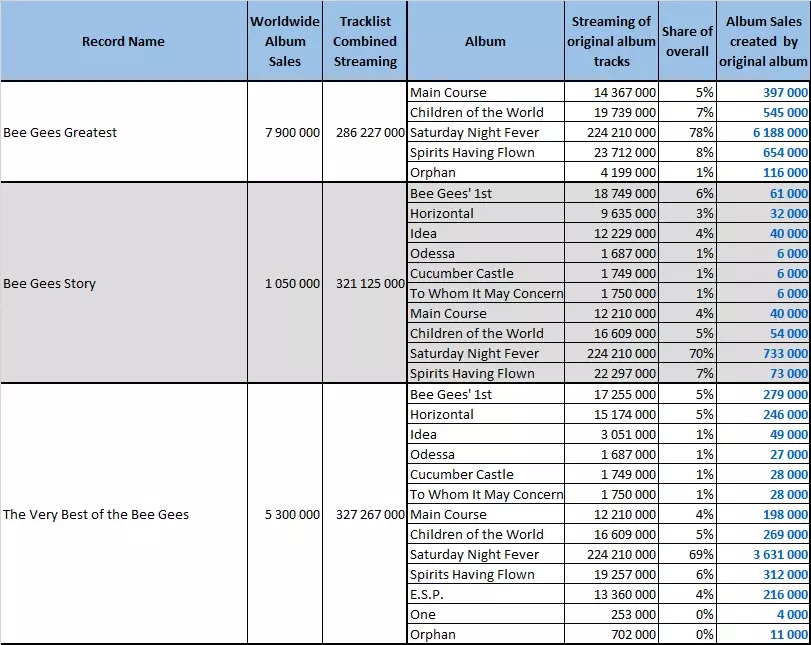
Remaining Long Format Part 4 – Major Compilation 3
Some 10 million more sales of post-2000 compilations, 6 million of which made by Saturday Night Fever.
Nowhere near as big, the likes Bee Gees’ 1st, Horizontal or Idea still enjoy notable sales from those compilations in comparison to their original sales.
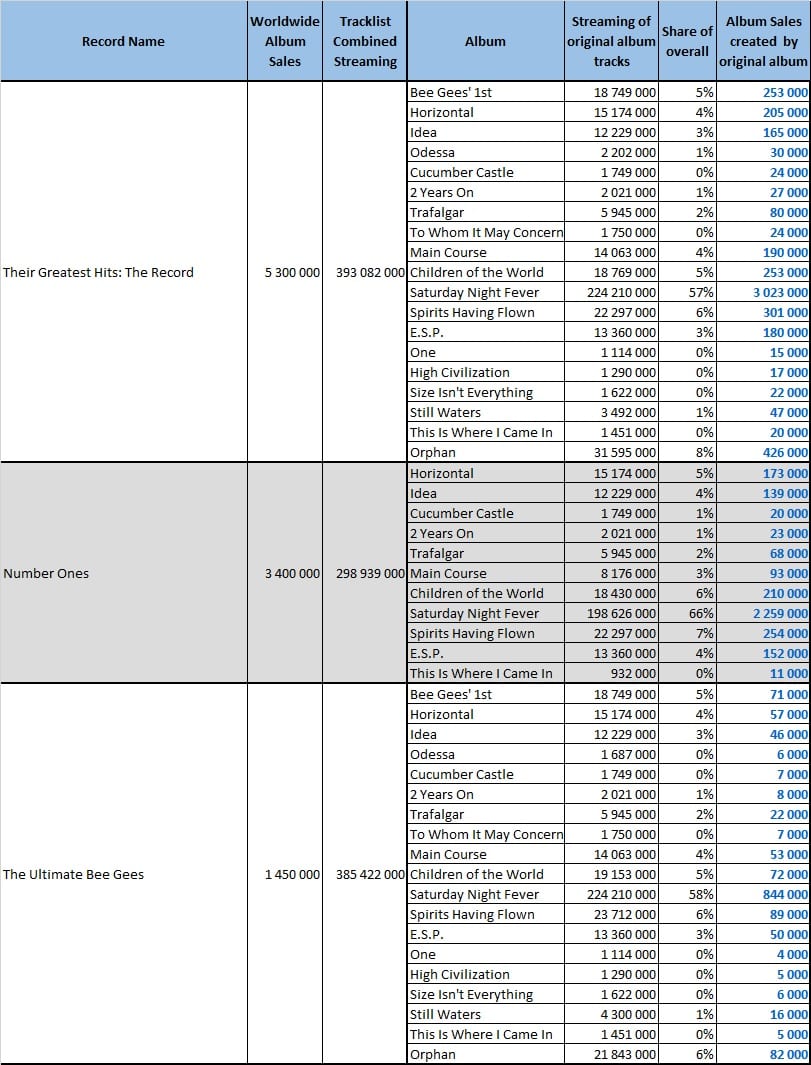
Remaining Long Format Part 5 – Minor compilation 1
With this table we get into troubled waters of minor compilations. Those releases haven’t come out in all markets. The first four focus on their pre-international debut songs.
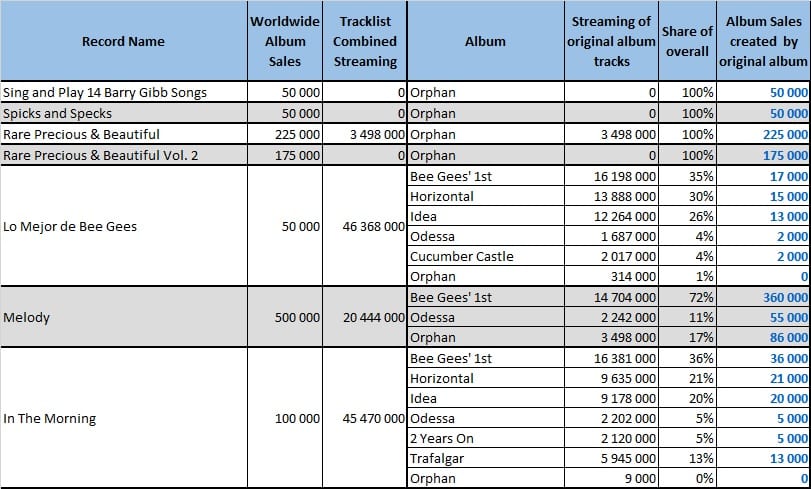
Remaining Long Format Part 6 – Minor compilation 2
A success like Saturday Night Fever obviously boosts the catalog of the related artist. At that time, Polygram and related issued various budget compilations. Most of them failed to chart but still sold solid numbers like Massachusetts which was the band favored set in the UK during 1978 to pick up their early hits.
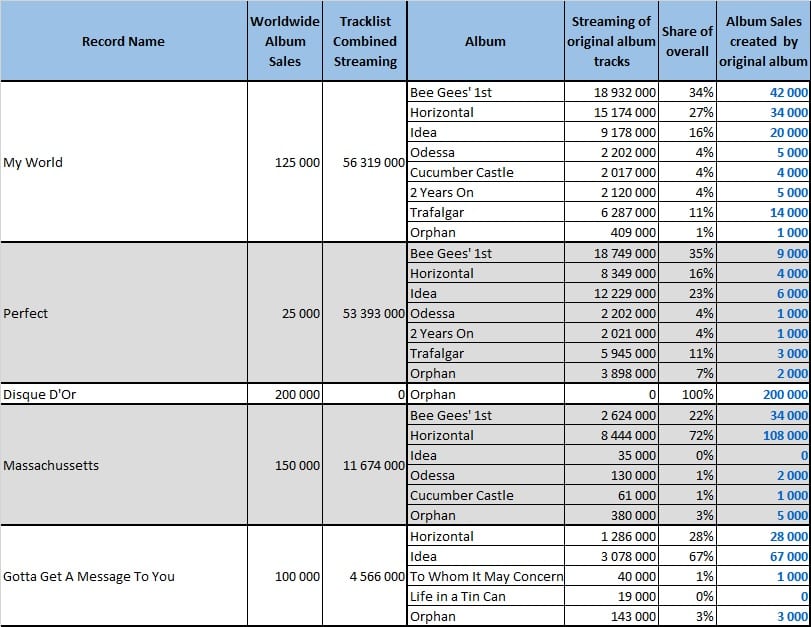
Remaining Long Format Part 7 – Minor compilation 3
More of the same with various local and budget compilations which exploited the Bee Gees early hits during late 70s madness.
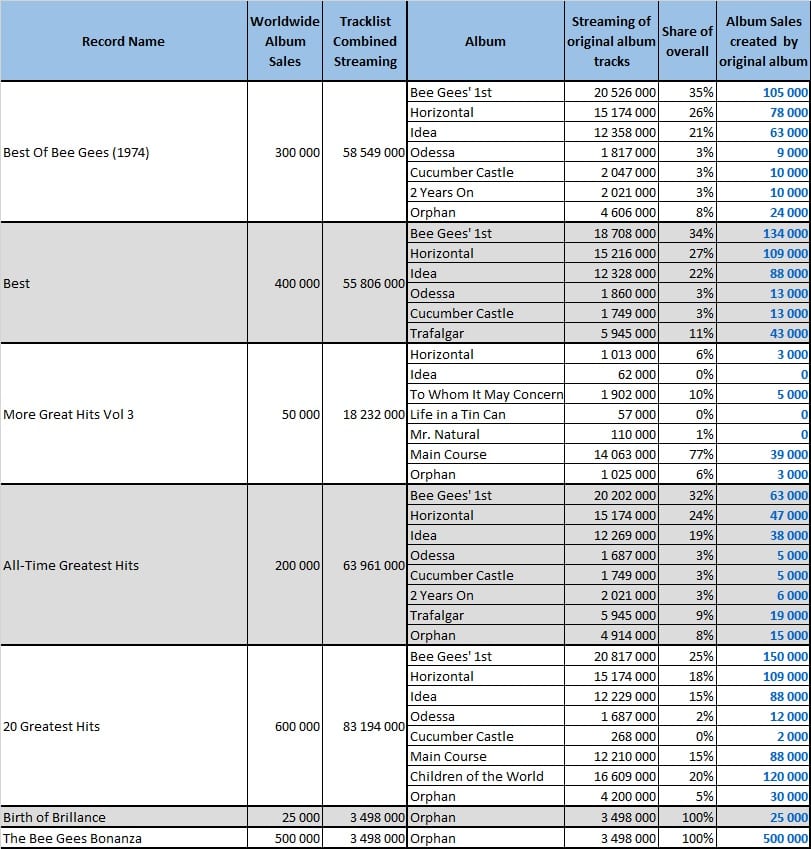
Remaining Long Format Part 8 – Minor compilation 4
Have you notice the difference from previous pages? More local compilations, unlike others those albums got released after 1978 yet with the immediate impact of Saturday Night Fever.
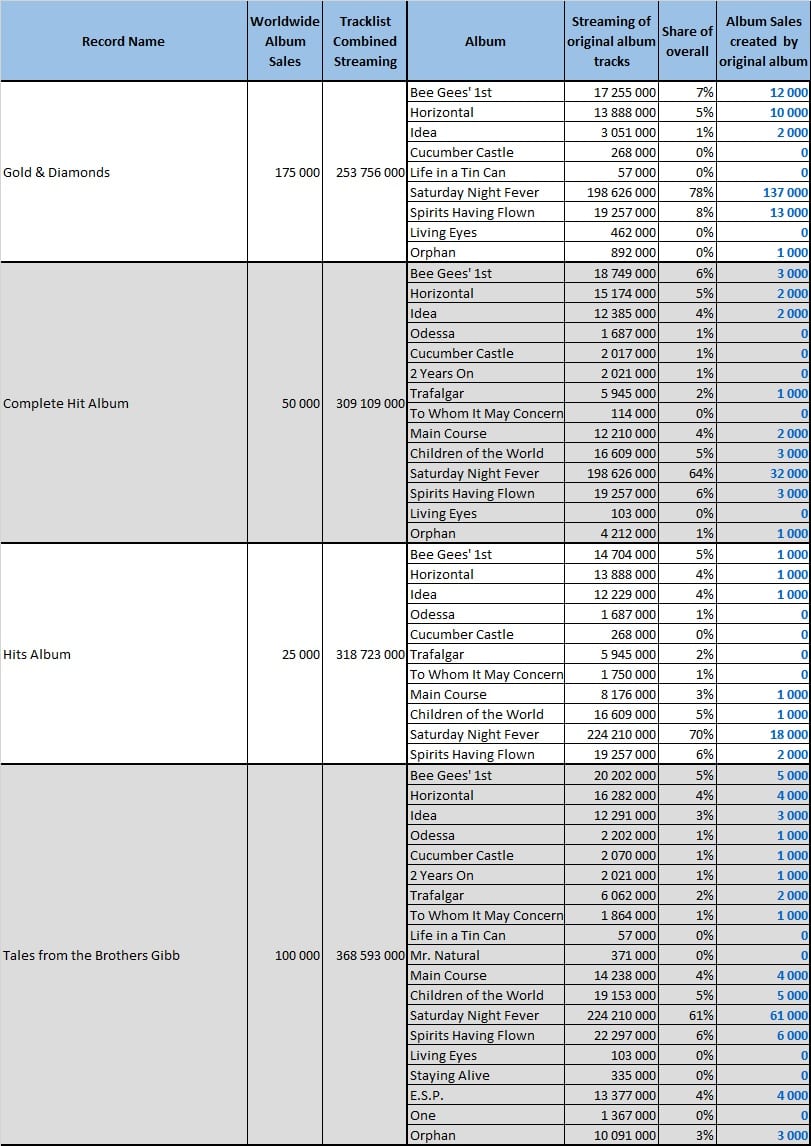
Remaining Long Format Part 9 – Minor compilation 5
Ditto from the last page. Not record breaking sellers, all those compilations put together create a sizeable amount of sales that we will be fully listing at the end of the compilation category.
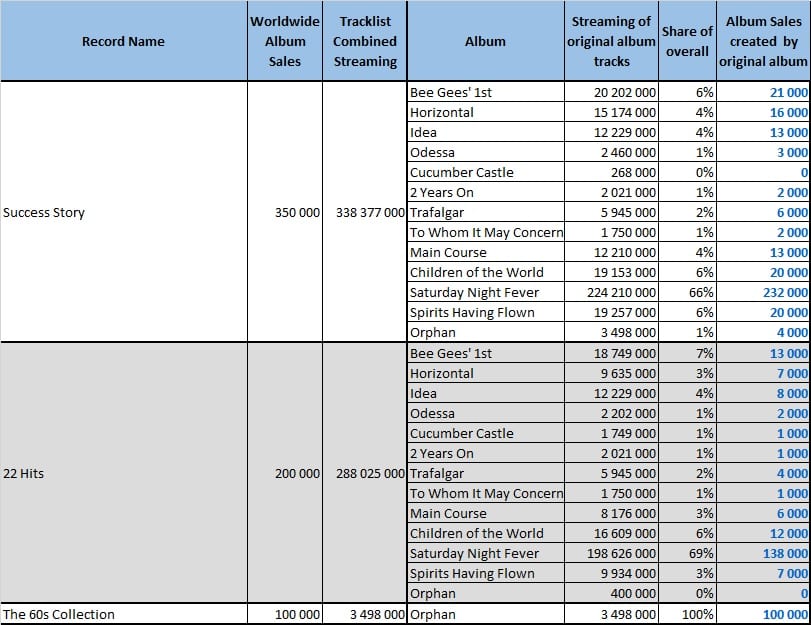
Remaining Long Format Part 10 – Minor compilation 6
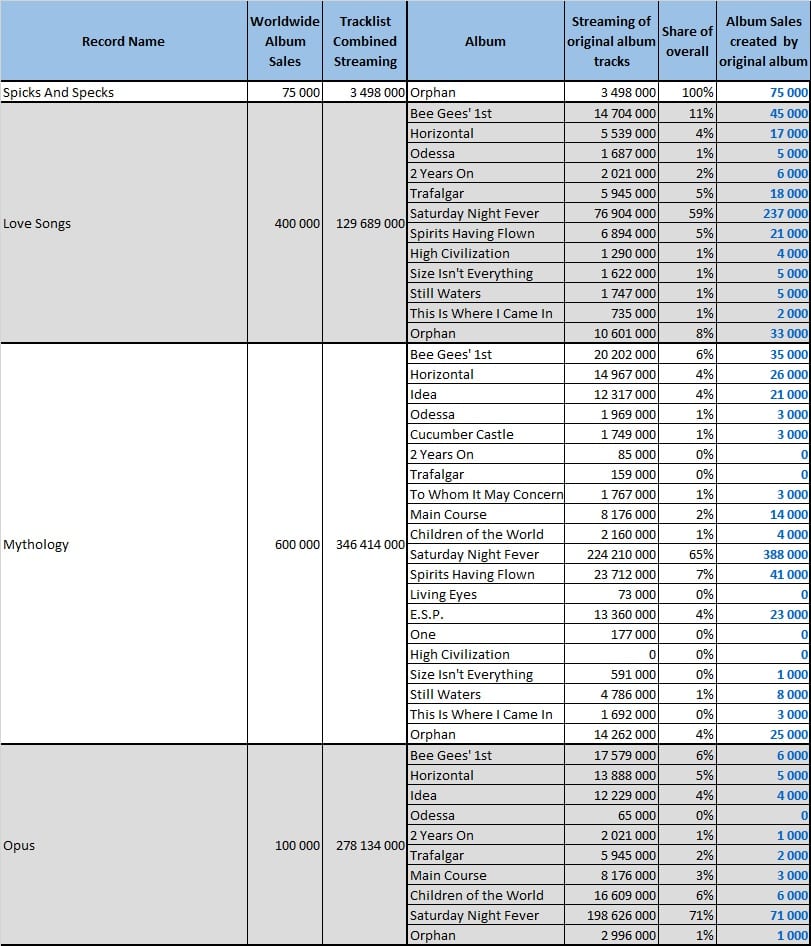
Remaining Long Format Part 11 – Box Set
Box sets including several original albums packaged together have their sales assigned in full to each of those records. Obviously, they haven’t sold that many copies but once again, rather than individual figures it is the upcoming total that matters…
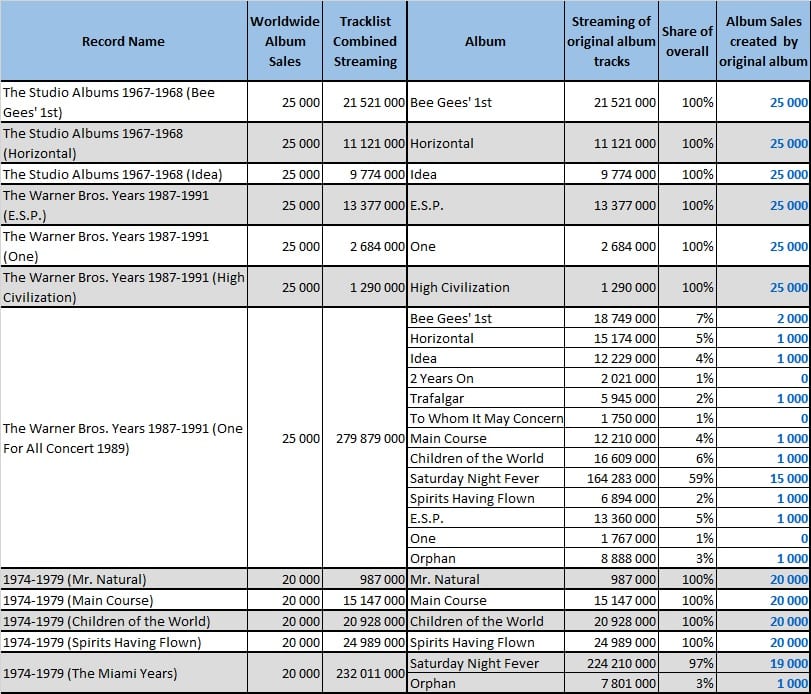
Remaining Long Format Part 12 – Music Video 1
One word about One Night Only, an absolutely terrific seller in the DVD category with a total to date now running past 2 million units.
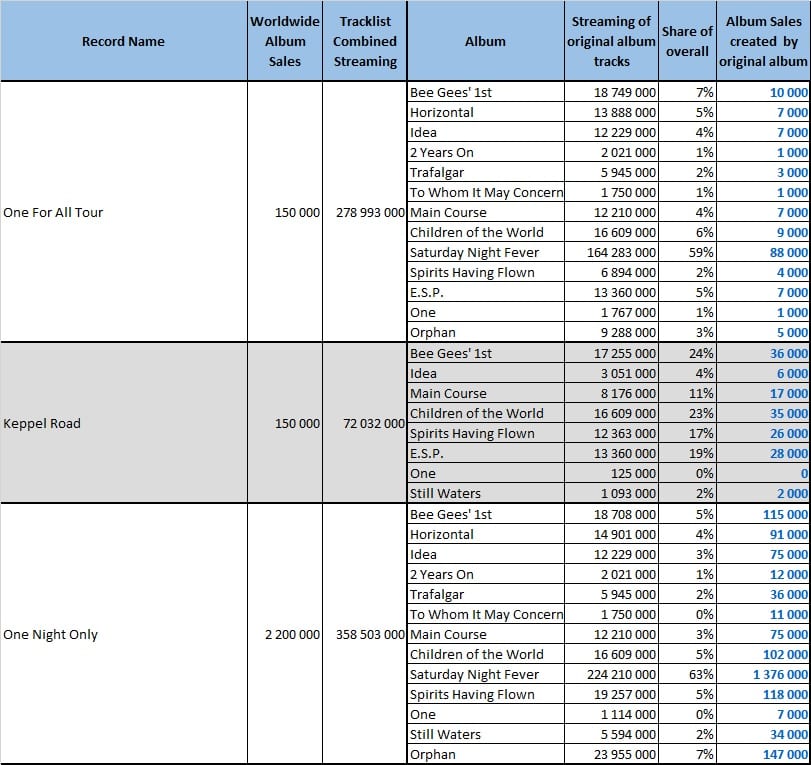
Remaining Long Format Part 13 – Music Video 2
The incredible success of the Bee Gees in Brazil from their very first albums ultimately got rewarded thanks to their strong DVD market. Indeed, Live By Request sold more than half of its 800,000 sales in that country alone!

Remaining Long Format Part 14 – Other releases
Unlike famous rock bands, the catalog of the Bee Gees is much less under control. Tons of compilations got issued here and there. On top of that, their catalog has been absolutely never audited for certification purpose. To fill this gap, a couple of extra millions are added, one for each – under the radar pre-Saturday Night Fever compilations and under the radar post-Saturday Night Fever compilations.
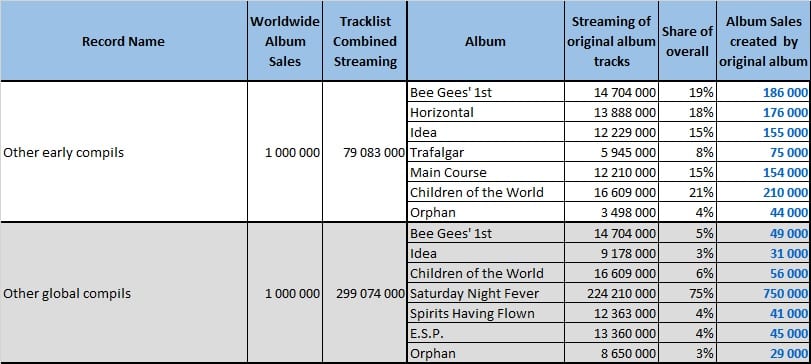
Full Length related records Sales – Summary
Here is the most underestimated indicator of an album success – the amount of compilation sales of all kinds it generated. Due to the dependency of the own studio album sales on those releases, they are a key piece of the jigsaw.
The final number of such releases sales generated by Saturday Night Fever is an insane 24,8 million units.
Let’s focus on other releases though as we will come back to 1977 Soundtrack later. The band first three albums sold each a bit more than 1,2 million pure album sales, they moved a combined 14 million compilations yet. The conclusion is a real statement – pure album sales are near irrelevant for very old LPs which came out in a singles era and got replaced by compilations.
The ultimate demonstration of a flop album is when a label completely ignores it in all its compilation / live / box packages. Please notice how Life in a Tin Can, Living Eyes or Staying Alive created zero value for those releases. It shows well that selling compilations isn’t granted, hits must be rated as valuable by the general public.
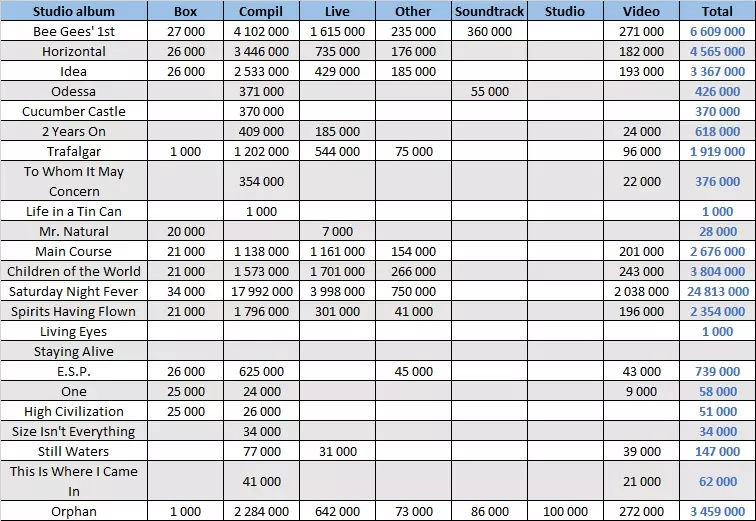
BEE GEES CAREER CSPC RESULTS
So, after checking all figures, how many overall album sales equivalent each Bee Gees album achieved? Well, at this point we barely need to do the addition of all figures defined all over this article!
In the following results table, all categories display figures in equivalent album sales. If different, pure sales are listed between parentheses.
As a reminder:
- Studio Album: sales of the original album
- Other Releases: sales of compilations generated thanks to the album
- Physical Singles: sales of physical singles from the album (ratio 3/10)
- Download Singles: sales of digital singles from the album (ratio 1,5/10)
- Streaming: equivalent album sales of all the album tracks (ratio 1/1500 for Audio stream and 1/6750 for Video stream)
Artist career totals
See where the artist ranks among remaining singers
Until now, the biggest album ever studied by our website was Rumours by Fleetwood Mac at 60,5 million equivalent albums sold overall. Inside the Top 5 is Grease with 51,9 million. Both of those albums outsold Saturday Night Fever in pure album sales since they got cannibalized at a lower extent by compilations. Thanks to the Commensurate Sales to Popularity Concept, the real success of Saturday Night Fever is restored with a tremendous total of 66,7 million equivalent album sales since its release. The best selling album ever with a considerable margin until the release of Michael Jackson‘s Thriller, this #1 spot sounds very logical.
Spirits Having Flown ends up at over 18 million, nothing to be ashamed about even for the immediate follow up of one of the biggest album ever. No other album top the 10 million level, five are in the 6-9 million territory though including their first three releases.
The Bee Gees got incredibly big but also incredibly weak at times. As low as 450,000 units for Mr Natural in spite of more than 40 years of sales in every format including all compilations. With a total 53 times weaker than Saturday Night Fever, Living Eyes may be regarded as one of the biggest flops of the music industry history.
Nevertheless, in total the Bee Gees sold a truly solid 156 million equivalent album sales. Ironically, this is pretty much a tie with the other disco legends ABBA at 155,7 million. Defining the likes Led Zeppelin or Rolling Stones as the first division of all-time top artists with near 200 million equivalent album sales or more, then the Bee Gees lead the second division by topping artists as popular as Whitney Houston, Bon Jovi or Metallica.
The following section lists their most successful songs.
As usual, feel free to comment and / or ask a question!
Sources: IFPI, Spotify, Chartmasters.org.
BIGGEST TRACKS – BEE GEES
The list of most successful songs is compiled in album equivalent sales generated by each of them. It includes the song own physical singles sales with a 0,3 weighting, its download and streaming sales with appropriate weighting too plus its share among sales of all albums on which it is featured.
- 1977 – Stayin’ Alive [Saturday Night Fever] – 31,660,000
- 1977 – How Deep Is Your Love [Saturday Night Fever] – 15,600,000
- 1977 – Night Fever [Saturday Night Fever] – 9,840,000
- 1979 – Tragedy [Spirits Having Flown] – 8,850,000
- 1976 – You Should Be Dancing [Children of the World] – 6,680,000
- 1967 – To Love Somebody [Bee Gees’ 1st] – 6,450,000
- 1977 – More Than a Woman [Saturday Night Fever] – 5,830,000
- 1978 – Too Much Heaven [Spirits Having Flown] – 5,670,000
- 1987 – You Win Again [E.S.P.] – 4,260,000
- 1967 – Massachusetts [Horizontal] – 4,040,000
- 1975 – Jive Talkin’ [Main Course] – 3,920,000
- 1968 – I Started a Joke [Idea] – 3,770,000
- 1971 – How Can You Mend a Broken Heart [Trafalgar] – 3,190,000
- 1968 – Words [Horizontal] – 2,700,000
- 1979 – Love You Inside Out [Spirits Having Flown] – 2,350,000
- 1997 – Alone [Still Waters] – 2,110,000
- 1968 – I’ve Gotta Get a Message to You [Idea] – 1,940,000
- 1975 – Nights on Broadway [Main Course] – 1,900,000
- 1991 – Secret Love [High Civilization] – 1,530,000
- 1970 – Lonely Days [2 Years On] – 1,490,000
We have more for you…
… checking out the upcoming artists or even voting for them!
